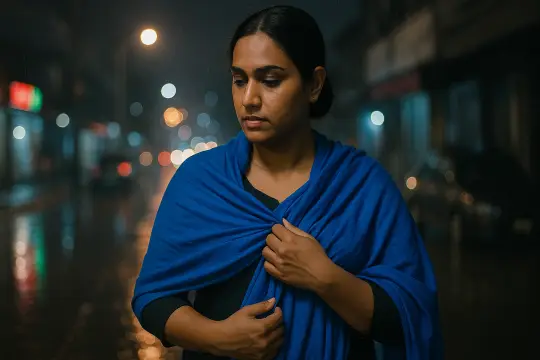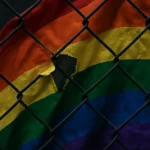Every night, by the narrow bridge in Narayanganj, Laila stands wrapped in her blue scarf—a transgender woman waiting under the dim streetlights. By day, she stitches blouses, folding fabric over the shoulders of others. But as evening falls, her phone lights up with small, transactional messages—“How long?” “Where?” Laila knows this path wasn’t her choice. Yet whenever she looks for work, the shopkeeper asks, “Are you a man or a woman?” The landlord says, “You’ll have to pay extra.” At hospitals, nurses whisper when they read her papers. When every door stays shut, only the street remains open—bare and unsafe.
One night, after a rough encounter with a customer from a nearby town, Laila sits at a roadside tea stall. Her tea goes cold. On the flickering TV, the news anchor speaks of “women’s empowerment”—the crowd claps politely. The shopkeeper’s eyes don’t move from her. He mutters, “People like her ruin the city.” Laila neither laughs nor gets angry; she just grips the edge of her blue scarf a little tighter.
The next afternoon, the police raid the area. Everyone runs. Laila doesn’t. “Where would I go?” she whispers. At the station, an officer asks softly, “Home?” Laila replies, “Whichever house I go to—the doors are closed.” They let her go, but on paper, her name gets a black mark—“Suspect.”
Laila’s only refuge is her small sewing work and a mother-daughter tea stall in the alley, where sometimes, over a cup of tea, she is spoken to like a person. The mother once said, “You’re just like us.” Tears welled in Laila’s eyes. Is it really so rare—to be spoken to like a human?
At night, it rains. Water gathers on the street, and neon lights shiver in the puddles. A customer tries to bargain, saying, “When you were…”—half insult, half scorn. Laila stands up and says, “Not tonight. I won’t work.” The man curses. Laila walks away—through the rain, through the drenched city.
On the bridge, she doesn’t throw her blue scarf into the sky. Instead, she holds it close to her chest and whispers, “I am Laila. I am human.” In the distance, the call to prayer echoes; nearby, the rain roars. Tomorrow will bring more sewing, more bargaining, more humiliation. Yet in this one moment—in the sound of the rain—she makes a quiet vow: no matter how many doors close, she will never tear her own name again.


